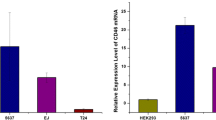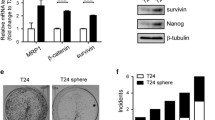Summary
To evaluate the effects of adenovirus (Ad)-mediated transfer of p53 and p16 on human bladder cancer cells EJ, EJ were transfected with Ad-p53 and Ad-p16. Cell growth, morphological change, cell cycle, apoptosis were measured using MTT assay, flow cytometry, cloning formation, immunocytochemical assays. Ad-p16 or Ad-p53 alone could inhibit the proliferating activity of EJ cellsin vitro. Ad-p53 could induce apoptosis of partial EJ cells. G1 arrest was observed 72 h after infection with Ad-p16, but apoptosis was not obvious. The transfer of Ad-p16 and Ad-p53 could significantly inhibit the growth of EJ cells, decrease the cloning formation rate and induce apoptosis of large number of EJ cells. The occurrence time of subcutaneous tumor was delayed and the tumor volume in 4 weeks was diminished by using Ad-p53 combined with Ad-p16 and the difference was significant compared with using Ad-p53 or Ad-p16 alone. It was suggested that the transfer of wild-type p53 and p16 could significantly inhibit the growth of human bladder cancerin vitro andin vivo.
Similar content being viewed by others
References
Tokunaga H, Shariat S F, Green A Eet al. Correlation of immunohistochemical molecular staging of bladder biopsies and radical cystectomy specimens. Int J Radiat Oncol Biol Phys, 2001,51(1):16
Wu Q, Possati L, Montesi Met al. Growth arrest and suppression of tumorigenicity of bladder-carcinoma cell lines induced by the p16/CDKN2 (p16INK4A, MTS1) gene and other loci on human chromosome 9. Int J Cancer, 1996, 65(6):840
Volker S, Karsten B, Susanne Het al. Adenovirally transferred p16INK4/CDKN2 and p53 genes cooperate to induce apoptotic tumor cell death. Nature Medicine, 1997,3(3):313
Ghaneh P, Greenhalf W, Humphreys Met al. Adenovirus-mediated transfer of p53 and p16 (INK4a) results in pancreatic cancer regression in vitro and in vivo. Gene Ther, 2001,8:199
Lukas J. p16, but not constitutively active pRb, can impose a sustained G1 arrest: molecular mechanisms and implications for oncogenesis. Oncogene, 1999,18:3930
Author information
Authors and Affiliations
Additional information
This project was supported by a grant from 863 Project of China (No. Z20-01-02).
Rights and permissions
About this article
Cite this article
Zhu, Z., Xing, S., Lin, C. et al. Adenovirus-mediated transfer of p53 and p16 inhibiting proliferating activity of human bladder cancer cell EJin vitro andin vivo. Current Medical Science 22, 324–326 (2002). https://doi.org/10.1007/BF02896776
Received:
Published:
Issue Date:
DOI: https://doi.org/10.1007/BF02896776




